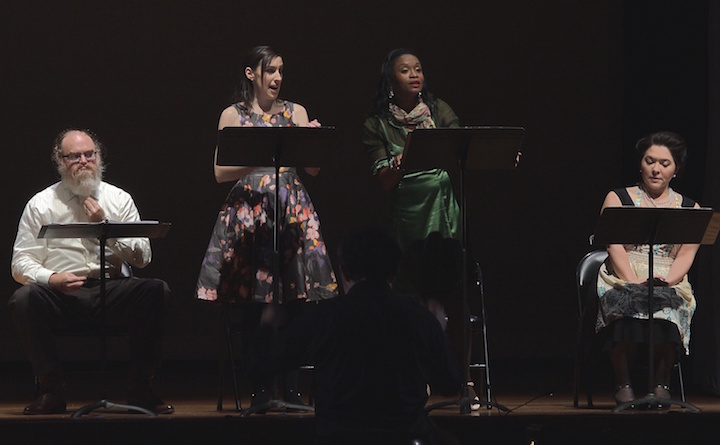
The Bay Area is an idyllic place, blessed with sublime weather and inhabited by courageous and talented people. The courageous part showed up at the Women’s March in Oakland on Saturday morning. The sublimely and musically talented showed up in the evening at the David Brower Center in Berkeley, where West Edge Opera opened its new Snapshot series.
Snapshot, curated by composer/ performer Brian Rosen and Artistic Director Mark Streshinsky, presents excerpts from eight previously unproduced chamber operas by Northern California composers and librettists. The excerpts are presented in concert form, with hints of staging and costuming. The program’s excellent singers are accompanied by members of the new music ensemble Earplay, known for its superlative skills interpreting challenging and newly written music, the composer’s ink barely dry on the score.
West Edge Opera’s Musical Director Jonathan Khuner and Earplay’s Mary Chun share conducting. Both have extensive experience in main-stage opera and experimental forms of music. This enabled West Edge to present a wider and more daring selection of work than might otherwise be presented in an art form that often seems stuck in the 19th century. And for contemporary composers and librettists who aren’t internationally famous the series provides an alternative to the insurmountable task of scaling the aesthetic wall of main-stage opera. Often opera today seems narrow in its imaginings and its reach.
Not so the opera excerpts presented at Snapshot.
Snapshot should be applauded for its wide-ranging and inventive material, both in words and music. That it is also beautifully presented and performed seems the frosting on a divinely delicious cake. It’s also fun.
Program One included four pieces by four sets of composers and librettists. The program opened with a selection from Famous, David Conte and John Stirling Walker’s homage to Isabelle Collin Dufresne, known as Ultra Violet during the 1960s. The text was adapted from Dufresne’s 1988 book, Famous for 15 Minutes: My Years with Andy Warhol. The excerpt is a witty and ironic revelation of a moment in Central Park when Andy Warhol (Jason Sarten) and friend (Kindra Scharich) follow the 1969 moon landing while Ultra Violet (Ann Moss) and a stray Rock Star (Jacob Thompson) conduct their own launch in the park’s nearby bushes. Conte uses cello, bass and piano in an ostinato to create the effect of rock-and-roll rhythms, enabling him to support the melodies sung by the singers without flattening the vocal lines.
William David Cooper and Will Dunlap provided a contrasting and more sober view of the world with a scene from Hagar and Ishmael. In this duet an angel (Jason Sarten) confronts the pregnant Hagar (Buffy Baggott), convincing her to return to the family that held her as a slave, and to give birth to her child there. Cooper mixes instrumental solos into the melodic exchange between the two singers, and has a fine sense of how silence can be used to heighten his compression of dynamics.
The second half began with Alden Jenks’ Afterworld, a wry spin on Mary Shelley’s Frankenstein. In Jenks’ version, robots invent a human. The Human (Ann Moss) sings of her confinement in a small room of their laboratory, while two Robots (Jacob Thompson and Jason Sarten) exhort her to “eat her peas” – their newly perfected invention. Like any child of well-meaning parents, she rebels. The music adds touches of synthesizer, and the robots sing their own form of mechanical-sounding Sprechstimme, which contrasts comically with the lyrical musings of the Human.
The program ended with Stephen Eddins and Michael O’Brien’s adaptation of a Eudora Welty story, Why I Live at the P.O. The excerpt was narrated by the “I” of the title (Chelsea Hollow), who tells a story of Southern comfort gone south in a flurry of sibling rivalry. The narrator becomes the dutiful Sister (Kristen Pinciotta) who dukes it out over family dinner with the bitchy and prodigal golden child of the family Stella Rondo (Shawnette Sulker), who has returned home with her “adopted” daughter. Mama (Kindra Scharich) and Pappa-Daddy (Jason Sarten) are bamboozled by the conniving Stella Rondo, and the narrator ends up, well, living at the post office. The setting is jazzy and sly, the swingin’ music delivered awesomely by piano, bass and drums.
To give credit where it’s due … the format and concept of this series appears elsewhere in the Bay Area. Mezzo-soprano Harriet Page presents similar new chamber opera excerpts in her ongoing “Fresh Voices” series, produced by Goat Hall/ San Francisco Cabaret Theater and now in its 16th year. How the West Edge Opera series differs is that its company base makes it more financially solid and gives the program more extensive connection with supporters. As delightful and important as Page’s work has been over the years, it has been primarily supported by Page with slim support and the occasional funding and grant, and been hampered by changes in venue and difficulties in outreach. It’s equally important to note that West Edge has taken this model to the next stage. And therefore it has more impact on opera’s future in the region and more broadly in the art itself.
A second set of four excerpts will be presented on the weekend of February 25-26. Those include works by Carla Lucero, Allen Shearer and Claudia Stevens, Linda Bouchard, and Liam Wade and Vynnie Meli. There are two performances, the first on Saturday evening in Berkeley and the second on Sunday afternoon at the Bayview Opera House in San Francisco. Should be another excellent set of performances. For information and tickets, visit westedgeopera.org.
– Jaime Robles
Photo: Jonathan Khuner conducts Jason Sarten (Pappa-Daddy), Kristen Pinciotta (Sister), Shawnette Sulker (Stella Rondo) and Kindra Scharich (Mama) in Stephen Eddins and Michael O’Brien’s adaptation of Eudora Welty’s “Why I live at the P.O.” at West Edge Opera’s new Snapshot series. Photo by Jeremy Knight.
